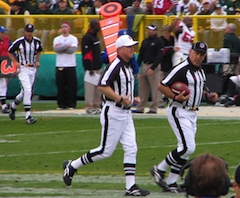During the post-game analysis, Steve Young seemed to fight back tears. “And it brings it down. To a level of other things that we see in sports, that’s not the revered state of the NFL that we grew and lived and breathed and experienced and built,” he rambled, blinking furiously, “and it’s, it’s coming down.”
For anyone who has been, say, hiking the Appalachian Trail, and missed the game-winning “touchdown catch” that looked more like an interception as time expired in Monday night’s Packers-Seahawks game, this gif from SBNation is worth a thousand words:

There had been signs of trouble for months. At the end of August, before the start of the regular season, a punt penalty debacle during a Patriots-Giants game at the Meadowlands set the farcical tone: one ref hesitantly signaling while another shouted corrections from the sidelines; Patriots coach Bill Belichick wandering grumpily onto the field; the original ref taking to the microphone to amend his earlier statement.
Over it all, bemused color commentators: “I didn’t expect a whole lot from the replacement officials in the pre-season and I don’t think we’ve gotten a whole lot,” one concedes. “We want the regular refs back in time and I think we’ll get them.” And, near the end of the clip, the fan recording the game on his television sighs: “Oh, God.”
We didn’t get them back in time. After the NFL’s contract with its referees expired in June, attempts to negotiate a new one quickly broke down. There were four sticking points: pay, benefits, reserve crews (the NFL wanted to add three; regular officials feared for their job security), and the addition of full-time officials to handle training and scouting (both sides agree this is a good idea but disagree on how much these new hires should be paid).
It may seem hard to side with the refs when you hear that the NFL is offering an average salary of $189,000 a year by 2018 for a part-time job. But everything’s relative; those figures sound much more modest when you consider that the league generates over $9 billion in revenue each year. As Michael Hiltzik pointed out in the Los Angeles Times, the $5 million that separates the league and the referees on retirement contributions represents just five hundredths of one percent of that sum.
Hiltzik’s column hinted at a fact that’s been downplayed in coverage of the replacement refs slapstick performance: They’re scabs in a labor dispute. These strikers might not tug at the heartstrings as easily as a group of grungy coal miners pleading their pitiful case on the picket lines. But that doesn’t change the fact that, as in the barely averted players’ lockout last year, this is a case of a wealthier, more powerful employer attempting to bend subordinates to his will.
Politics aside, the fact is that rules define a sport. Referees who grasp those rules and can apply them accurately prevent football from degenerating into Calvinball. One of the reasons the replacement refs are so terrible is that officials from the major college conferences stood in solidarity with their NFL counterparts, which forced the league to draw from less skilled pools: the lower college divisions, high schools, the Lingerie Football League’s discard pile.
The league’s refusal to budge hasn’t just manufactured a number of surprising upsets: it’s also potentially life-threatening. The Seahawks’ Golden Tate’s punishing hit on the Cowboys’ Sean Lee in Week 2 wasn’t exactly Thunderdome material, but it was certainly illegal. The refs, however, were too busy calling an imaginary unnecessary roughness foul against the Cowboys’ Bruce Carter (for pushing the Seahawks’ QB out of bounds, relatively gently) to notice.
But through three weeks of questionable calls, reversed rulings, and basic rule misunderstandings, most fans crossed the picket lines. (A friend of mine did decide to boycott football after a questionable pass interference call in the Steelers-Jets game in Week Two, a choice he is now predictably smug about.) The errors we tuned in for ranged from the understandable to the baroque (the 49ers got two extra time-outs in their loss to the Vikings last Sunday; Ken Roan, the official responsible, has made several other egregious mistakes, as exasperatedly chronicled by the New York Times.)
During the Titans’ win over the Lions on Sunday, the officials accidentally marked a 15-yard personal foul from the wrong 44 yard line, giving the Titans an extra 12 yards on the drive that resulted in a game-winning field goal. On the same day, during the Patriots’ loss to the Ravens in Baltimore, Ravens coach John Harbaugh was penalized for unsportsmanlike conduct when he tried to tap a ref on the shoulder to signal a time out; at the end of the same game, Belichick grabbed an official’s arm while attempting to determine whether the game-winning field goal, which looked as though it might have drifted outside of the uprights, would be eligible for review. It wasn’t, and he was fined $50,000.
Now that the league and referees have settled it’s worth considering what our willingness to support scabs in the NFL might say about our ability to overlook abuses of power and corporate bullying in other contexts. I want to believe that, in parallel universe where Roger Godell continued to play hardball, ratings would have dropped dramatically.
But among football fans, myself guiltily included, it seems entertainment is valued over fairness, and in a country generally hostile to unions, only the most egregious workplace violations will make management bow to the collective bargaining will.
